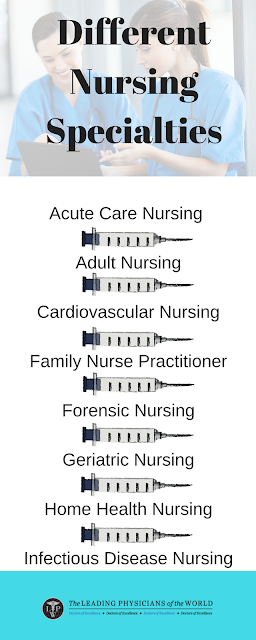List of Nursing Specialties
One of the
greatest aspects of nursing as a profession is the ability to work in many
different roles. It is a field which is constantly evolving. Registered Nurses
can work bedside with the sickest patients or opt to care for those who are
mostly well. They can work directly with patients or indirectly by
collaborating with the team or others involved in healthcare to help patients.
For every individual temperament and personality a nursing specialty exists.
The pace of a working environment can be fast and full of adrenaline, or a
slower pace with lots of time to spend bonding with patients and families. RNs
can have a great amount of pressure to do everything perfectly and quickly with
extremely high stakes or may work in an environment that is much more relaxed
with "well" patients who want to chit-chat while they wait for their
physician's appointment. The options are nearly endless and here are some of
the most popular nursing specialties.
1.
Pediatric
nurse
The first
requirement of being a pediatric nurse is that you must love kids!
Undergraduate programs do not offer a pediatric specialty, but you can get
experience by seeking out a pediatric rehabilitation unit, pediatric intensive
care unit, or other clinical environment that caters to kids. After gaining
experience working with children as a registered nurse, pediatric nurses can
take an exam to become a Certified Pediatric Nurse (CPN).
Necessary education:
- RN license
- Certified Pediatric Nursing (CPN) license
- Certified Nurse Midwife
2.
Certified
nurse midwife
Certified
nurse midwife is one of the “advanced practice” specialties which require extra
schooling, experience and formal certification.As a certified nurse midwife,
you will work alongside obstetricians seeing patients. When low-risk
pregnancies are involved, you will follow your patient throughout her
pregnancy, provide routine check-ups and educate her on prenatal care. In some
states, you can even deliver babies by yourself. You certainly will help
deliver babies, whether you are allowed to do it solo or not. After the birth,
you will continue to educate your patients in how to care for their newborn,
and continue with routine exams as needed.
3.
Psychiatric
mental health nurse practitioner
Psychiatric
Mental Health Nurse Practitioners(PMHNPs) treat patients with a range of
psychiatric and mental health disorders, as well as behavioral challenges.
Though these ailments differ from other issues most nurse practitioners
address, psychiatric care has its own unique rewards. Providing medical
treatment, as well as counseling and other mental comfort to patients, means
psychiatric nurse practitioners can make a life-changing, positive impact.
Nurse practitioners in psychiatric care offer daily physiological, mental,
emotional, and even spiritual support. They also help patients avoid isolation,
poverty, and other circumstances that can arise as a result of these
conditions.
4.
Clinical
Nurse Specialist
Clinical
nurse specialists are authorized to work with patients in a clinical setting.
They are able to diagnose and treat patients who are suffering from one or more
of the “normal” health problems people go to the doctor for. They also prescribe
medicine.A clinical nurse specialist is another advanced practice specialty, so
your RN license is only the beginning. In addition, you will need a bachelor’s
and a master’s degree in nursing, with an emphasis in clinical practice.
5.
Gerontological
nurse practitioner
GNPs are in
high demand due to the size of the baby boomer population and the increase in
average lifespan. The number of elderly patients will increase more and more in
the coming years. If you decide to become a gerontological nurse practitioner,
you could work in a nursing home, hospital, or clinic. The elderly have a
specific set of health needs, which requires its own nursing specialization.
Whether you
need to advance your education and complete your BSN, MSN, or DNP, or you’re
just starting out in the medical field, nursing offers unbelievable
career paths. Becoming a specialized nurse in one of these high-paying fields
requires ample education, along with a passion to help others and the
determination to evolve.




Comments
Post a Comment